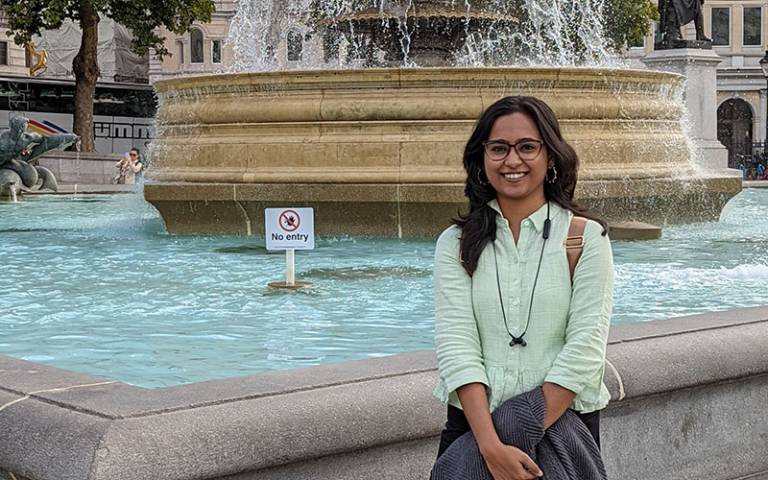Shruti Das is an Education, Gender and International Development MA student, class of 2023. She talks to us about her experience studying at IOE as a recipient of the Centenary Master's Scholarship.
 What is your educational background?
What is your educational background?

I completed my MA in International Relations at the Jawaharlal Nehru University (JNU) in Delhi in 2019. It was an enriching experience and introduced me to the concepts of politics, foreign policies, human rights, gender and education.
Before undertaking the MA at UCL, I worked in Delhi as a researcher for more than three years looking at the intersection of gender and children’s education.
What are your motivations for pursuing a graduate-level qualification?
In my home country, alongside patriarchal norms, policies and practices are often at loggerheads. Also in India, gender and education are rarely explored in academic courses.
Thus, with modules like Planning for Education & Development, I sought to have a deeper understanding of the field and develop my knowledge through research and professional expertise.
What is the best thing about your course?
The course not only provides me with the opportunity to gain new knowledge and skills, but due to having classmates all over the world, it also enables me to have a wider understanding of the global environment.
“The heterogeneous perspectives enable me to develop a deeper understanding of similar challenges alongside giving me broader contextual awareness.
What do you find interesting about your field of study and what inspires you?
I am fascinated by the Gender, Education and Development module because it allows us to explore the links between sexual divisions and gender inequalities in the political economy of family, education, and cultural production.
“I am quite interested to learn about alternative gender-sensitive strategies and approaches in education to overcome the challenges and social divisions in low-to-middle-income countries.
What are your career plans once you’ve completed your current programme of study at UCL?
I’m passionate about providing students with rights-affirming education, free of stigma. Through creative methods and integrating socio-emotional learning tools, I hope to work with (government) schools in South Asia to implement intersectional gender curricula and devise genderfluid teaching methods.
What is it like studying in London and do you think it has benefited your studies?
London is indeed a beautiful city! Having access to state libraries and museums has contributed to the enriching learning experiences I've had.
In London, I have also had the privilege of living at the International Students House, one of the most welcoming and warm places that bring together diverse and creative minds to learn from. In addition, during breaks from my studies, I also walk in the Regent's park and Hyde Park.
As an international student, how do you think the system of learning and researching at UCL differs from that in your own country?
I was primarily taught by and worked with local students and peers in India, whereas at IOE, I can engage with students and faculty across the globe, which wouldn’t have been possible back home.
“Additionally, as an international student, I can exchange decolonial insights I gained in the Global South at a global level both inside and outside of institutions.
How has your scholarship helped you achieve your aspirations and what impact has it had on your studies?
My worldview of London has only been through books and (motion) pictures. Without the IOE ISH Mary Trevelyan Centenary Scholarship, I wouldn’t have been able to study at UCL, learn from renowned researchers and fellow scholars, and experience life in London.
“After experiencing my first international travel, it was bittersweet to realise the lengths people could reach and achieve with adequate funding.
Last updated 23 February 2023.
 Close
Close


